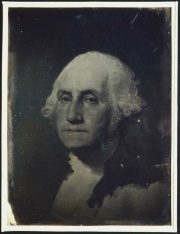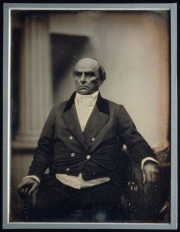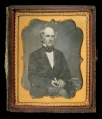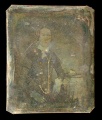Difference between revisions of "Daguerreotype"
(username removed) |
|||
| Line 2: | Line 2: | ||
== Description == | == Description == | ||
| − | An early photographic process developed by Louis Daguerre of Paris in 1837. Daguerreotypes were primarily used for portraits from 1840-1860. Initially the copper daguerreotype plates were cold roll-cladded with a thin silver layer. After 1850, an additional electroplated silver layer was added to produce a harder surface. The silver layer was sensitized to light with iodide or bromide vapor. After exposure to the image, the plate was developed with [ | + | An early photographic process developed by Louis Daguerre of Paris in 1837. Daguerreotypes were primarily used for portraits from 1840-1860. Initially the copper daguerreotype plates were cold roll-cladded with a thin silver layer. After 1850, an additional electroplated silver layer was added to produce a harder surface. The silver layer was sensitized to light with iodide or bromide vapor. After exposure to the image, the plate was developed with [[mercury]] fumes which attached to unexposed portions of the plate to form a positive metallic image. The plate was fixed by removing any remaining [[silver halide]] with a [[sodium thiosulfate]] solution. Daguerreotype images tended to be weak until 1840 when a method to enhance the image with gold toning was introduced; later images were often hand colored with pigments. The surface of the daguerreotype is delicate and readily damaged by moisture and pollutants. The images were often sealed in decorative metal mats with a glass cover for protection. |
[[File:43.1402-CR2247-d1.jpg|thumb|'''MFA Acc. #:''' 43.1402]] | [[File:43.1402-CR2247-d1.jpg|thumb|'''MFA Acc. #:''' 43.1402]] | ||
| + | |||
== Other Properties == | == Other Properties == | ||
Revision as of 13:26, 13 January 2014
Description
An early photographic process developed by Louis Daguerre of Paris in 1837. Daguerreotypes were primarily used for portraits from 1840-1860. Initially the copper daguerreotype plates were cold roll-cladded with a thin silver layer. After 1850, an additional electroplated silver layer was added to produce a harder surface. The silver layer was sensitized to light with iodide or bromide vapor. After exposure to the image, the plate was developed with Mercury fumes which attached to unexposed portions of the plate to form a positive metallic image. The plate was fixed by removing any remaining Silver halide with a Sodium thiosulfate solution. Daguerreotype images tended to be weak until 1840 when a method to enhance the image with gold toning was introduced; later images were often hand colored with pigments. The surface of the daguerreotype is delicate and readily damaged by moisture and pollutants. The images were often sealed in decorative metal mats with a glass cover for protection.
Other Properties
Amalgam particles range in size for 0.1 to 1.0 micrometers
Hazards and Safety
Damaged by moisture and polllutants (e.g., volatile sulfur compounds)
Additional Information
S.M.Barger, W.B.White, The Daguerreotype Nineteenth-century Technology and Modern Science. Smithsonian Institution Press, Washington DC, 1991.
Additional Images
Authority
- Luis Nadeau, Encyclopedia of Printing, Photographic, and Photomechanical Processes, Atelier, New Brunswick, 1997
- The Dictionary of Art, Grove's Dictionaries Inc., New York, 1996 Comment: 'Photography'
- Van Nostrand's Scientific Encyclopedia, Douglas M. Considine (ed.), Van Nostrand Reinhold, New York, 1976
- Random House, Webster's Encyclopedic Unabridged Dictionary of the English Language, Grammercy Book, New York, 1997
- Thomas B. Brill, Light Its Interaction with Art and Antiquities, Plenum Press, New York City, 1980
- Caring for your Collections, Arthur W Schulz (ed.), Harry N. Abrams, Inc. , New York, 1992
- Encyclopedia Britannica, http://www.britannica.com Comment: "daguerreotype." Encyclopædia Britannica. 13 Nov. 2004 .
- Wikipedia, the free encyclopedia, at http://www.wikipedia.com Comment: http://en.wikipedia.org/wiki/Daguerreotype (Accessed Nov. 11, 2004) - Technique announced to French Academy of Science on Jan. 9, 1839.



